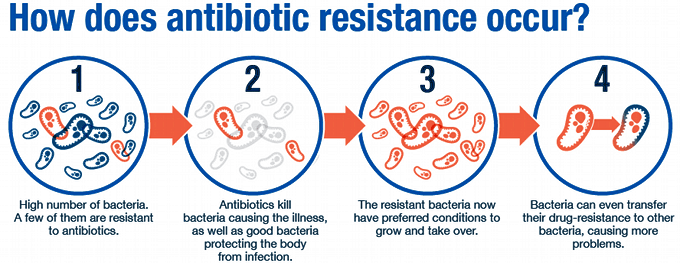|
Written by Neha Mukherjee '22 Edited by Ashley Nee '22
Antimicrobial resistance proves to be specifically interesting from a public health lens. Every time an antibiotic is used, some exposed bacteria can build immunity to it. This resistance can also be transferred to other bacteria. So, when one person takes an antibiotic, some bacteria develop resistance and when these bacteria are transferred to other people, they may become immune to antibiotics. To decrease antimicrobial resistance, there must be a decrease in antibiotic use.
While there are scientific methods being explored to decrease antimicrobial resistance, there are also legal and political actions that can be taken to aid this global health issue. Through the use of treaties and political declarations that limit the use of antibiotics, antimicrobial resistance can be significantly decreased in the coming years. The Yale School of Public health points to four qualities that make a successful treaty. First, it talks about a translational problem. Second, it has specific goals as a result. These first two qualities ensure that the treaty has purpose and will benefit all parties involved. Third, it is realistic and can actually function. Lastly, it must be the best solution among all other solutions. Since antimicrobial resistance meets all of these criteria, a treaty would aid in resolving this problem by holding countries accountable in international cooperation. An alternative measure would be a political declaration. Some of these measures have already begun, including the 71st United Nations General Assembly Meeting, where a “political declaration of the high-level meeting on antimicrobial resistance” was made. These kinds of declarations, while easy to modify, can be less effective because they do not hold individual countries accountable for breaking policy. It is necessary to employ both scientific and political efforts to decrease antimicrobial resistance, ensuring a safer and healthier future. Antimicrobial resistance is a problem that cannot be solved without cooperation from the individual. This can start with political mechanisms, but eventually humans themselves must realize the impact that antibiotic overuse has on their own health and societal health. [1] Padiyara Ponnu PP, Hajime Inoue HJ, Marc Sprenger MS. Global Governance Mechanisms to Address Antimicrobial Resistance. Yale School of Public Health. 2018; 11, 1-4
0 Comments
Leave a Reply. |

